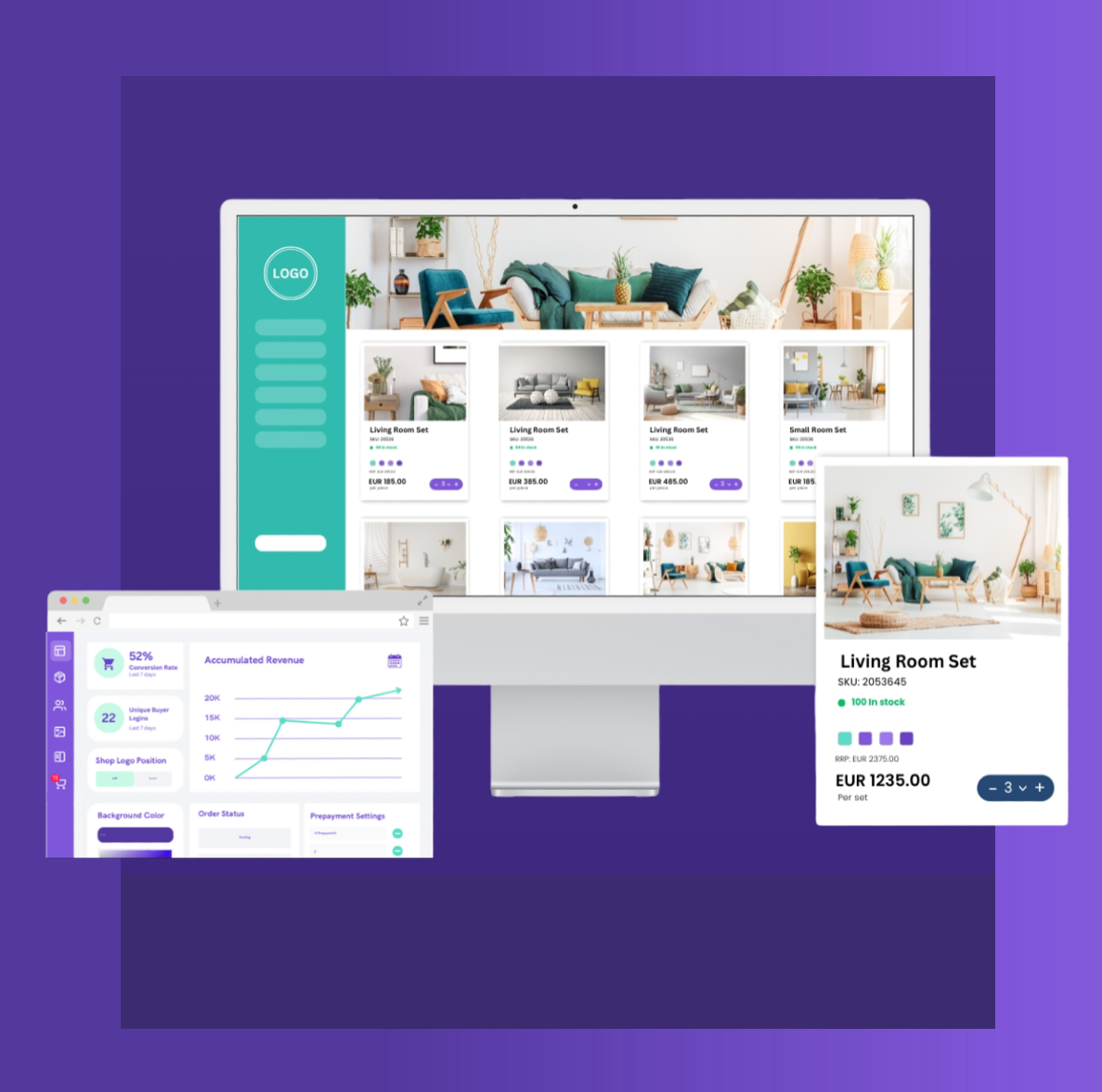The Best eCommerce platforms
What is an eCommerce platform?
An eCommerce platform is an internet-powered commercial selling and buying tool. The business software will typically feature a search toolbar to enable customers to find products, a cart to manage the selected products, and a payment gateway. Businesses will typically use eCommerce platforms to build online stores.
Ecommerce comes in different models, primarily B2B, B2C, and C2C. At the very least, a customer should be able to visit an eCommerce platform and locate items, cart the selected products, and check out in the simplest ways possible.
How to choose the right eCommerce platform?
Every business has a unique model and needs, and taking your company online doesn’t mean that any of those values should change. But even with that, you’ll need to look out for some out-of-the-box salient features, regardless of your niche. Of course, a lot goes into having a final custom e-store for your business, but consider what we’ll share here the bare minimum when building your eCommerce platform.
We will cover 4 of the key characteristics to be aware of when choosing a B2B eCommerce platform. The 4 characteristics are:
- The set-up
- User experience
- The “looks”
- Pricing of eCommerce platforms
If you are doing a B2B eCommerce platform comparison, these are the four main characteristics to look for.

The set-up
Time is a valuable resource. That is why the time you have to invest in setting up your B2B eCommerce platform is important.
When it comes to setting up a B2B platform, time is not only important, as it takes time away from other tasks. It is also important in the sense that you want to digitize your B2B and wholesale as soon as possible. You don’t want to be left behind and potentially lose your customers to the competitor. You know, the one who already invested in a B2B eCommerce platform.
This is also why we believe that you should not invest in a custom-built B2B eCommerce platform. (Unless you have very specialized needs or products). A custom-built B2B eCommerce solution built from scratch will take a long time to get done AND will cost a lot of money.
So the time it takes to set up a B2B eCommerce platform is important. As such, you should probably not choose a solution that takes months to get started with. Especially not when it can, in fact, be done in a matter of days.
User experience
A B2B eCommerce platform needs to be easy to use for both you and your customers. The user experience needs to be on point and user-friendly. If it isn’t, neither you nor your retailers will want to use it, and you might as well stick to manual order handling.
Navigating a B2B order portal should be intuitive for your retailers, and they should be able to place an order with just a few clicks. Only that way will both you and your retailers truly appreciate the new B2B platform – this means happier customers, increased sales and more time saved.
The “looks”
As mentioned before, one of the main benefits of a B2B platform is increased sales. One of the reasons for this is the visual appeal a B2B order portal provides. Compared with traditional B2B order channels such as spreadsheets, phone, and email, a B2B order portal showcases your product the way they deserve.
This also means that the “looks” of the B2B eCommerce solution you choose are rather important. After all, no matter how good-looking your products are, they can’t make up for an ugly B2B order portal.
Instead, make sure to choose an “aesthetic” B2B e-commerce platform and B2B order portal. This will make your products more appealing and allure your customers to purchase more.
Furthermore, it’s a good idea to choose a B2B eCommerce solution that allows you to customize the “looks” to match your brand and visual style.
Pricing
Perhaps the most important factor when deciding on what B2B eCommerce platform to invest in is the price.
B2B eCommerce platforms come in a wide range of prices, and there is no need to pay more than necessary. Also, if the B2B eCommerce solution is TOO expensive, it might simply not be profitable for your company to invest.
So it is important to go with a solution that matches your budget and provides the perfect balance between functionality, features, and efficiency on one side and price on the other.
List of the best eCommerce platforms
Shopify
Shopify is an eCommerce platform that allows merchants to set up online shops. While primarily focused on B2C, Shopify does include some B2B features in their Shopify Plus solution. Using Shopify POS, merchants can sell products in person, mostly in retail. Shopify came into existence slightly more than a decade ago and is one o
f the most popular platforms, hosting hundreds of online stores.
You can set up a Shopify shop to offer products and services, including physical and digital items, memberships, consultation services, classes, and rentals.
Features
● It contains tens of professional themes for customizing your store
● Shopify is a mobile-commerce-ready platform
● You can work with an expert to build your shop
● Features a complete blogging tool
● Users can create shops using their domain names
Turis
Turis is a business-to-business (B2B) tool that features any wholesale business. With Turis, you don’t simply end up with an online store; instead, it comes packed with a host of advanced functionalities meant to make the B2B experience painless for businesses and their customers.
Turis allows you to build your self-controlled B2B shop, incorporate your brand identity, and invite customers to visit, browse and purchase from your online store. And if you’re looking to start small with Turis, you’re welcome to try the free trial version as you scale up operations.
Features
● Eliminates manual work through a digitized ordering system for your customers
● Come with 2,000+ integration options
● It contains a free trial
● Enjoy valuable insights on customer behaviours, patterns, etc.
● Get set up in no time with Turis’ fast and easy implementation
● It features easy invoice acceptance and settlement methods to ensure prompt payments
● Allows for easy content management for SEO
● Sell both digital and physical products and services
● 24/7 customer support by Turis’ specialists, and much more.
WooCommerce
WooCommerce is not new, and it is a free-ish plugin. It is famed for its SEO marketing prowess and tens of integrations. Just like Shopify, the main focus of WooCommerce is on B2C transactions, but adding various plugins will allow you to mimic a B2B eCommerce solution. The platform allows you to host your eCommerce shop on multiple hosting sites, including Bluehost, Wix, and more.
Being a customizable open-source software, WooCommerce is built to accommodate multiple business needs. It is powered by WordPress and relies on additional (free and paid) plugins to grant you a complete eCommerce experience.
Features
● It is open-source and customizable
● Features a content management system
● Boasts hundreds of extensions and integrations
● Permits selling of physical and digital products and services
● Contains order and customer management functionalities to build customer rapport.
BigCommerce
BigCommerce is yet another online store-building tool to help you boost your digital visibility locally and internationally. In addition, the tool allows you to integrate with other sales channels such as Amazon and eBay.
While it doesn’t feature a free version, BigCommerce comes with a 15-day trial period for new shop owners. According to the site, users can customize their shops, giving the clients a one-of-a-kind experience.
Features
● Features 24/7 customer support
● Builders can customize their shops to match their aspirations
● It comes with a 15-day trial period
● It is mobile-friendly
● Allows you to connect to your POS
● Multiple integration options
Magento
Magento is open-source software released in 2009. In 2015, however, Magento rebranded to version 2.0 to improve its visibility and stability. Two years later, Adobe acquired and ran it in two versions, namely Magento Open Source and Magento Commerce.
The tool works well with established businesses and existing demand. Magento is famed for its massive library of integrations but requires more time and expertise to set up.
Features
● Mobile-optimized shopping
● Features customizable panels
● Contains integrated payment and shipping processes
● It comes in free and paid versions (Magento Open Source is free while Magento Commerce retails at between $15,000 to $50,000 annually)
● 24/7 customer support
Launching Your First B2B Store?
Let us launch your B2B store with us today and boost your sales – no coding needed, just expert guidance with our People-to-People support every step of the way.
Book personal demo

